Data management tools enable organizations to prepare and deliver analysis-ready data for strategic decision-making, business intelligence (BI) initiatives, machine learning (ML) applications, and more. The software in this category consists of platforms, services, and tools that ensure accuracy, consistency, security, and compliance throughout the data lifecycle.
We evaluated the top data management solutions currently on the market to see how they compared on core and enterprise features, customer support, integrations, vendor profile, and price. Here are our picks for the top data management tools of 2023:
The top data management tools of 2023 range from leading open source platforms to highly-specialized data management platforms for research and development and other related research applications.
| Core Features | Enterprise Features | Support | Integrations | Pricing | |
|---|---|---|---|---|---|
| Astera | ★★★★½ | ★★★★½ | ★★★★★ | ★★★★ | ★★★★ |
| Qlik Talend | ★★★½ | ★★½ | ★★★½ | ★★★ | ★★★★ |
| Azure Data Factory | ★★★★½ | ★★★★½ | ★★★★½ | ★★★★★ | ★★★★½ |
| Ataccama ONE | ★★★★½ | ★★★★½ | ★★★★★ | ★★★½ | ★★★ |
| DataHub | ★★★★★ | ★★★★★ | ★★½ | ★★★★★ | ★★★★★ |
| Collibra | ★★★ | ★★★★ | ★★½ | ★★★½ | ★★★ |
| Atlan | ★★★★ | ★★★ | ★★½ | ★★★★★ | ★★★ |
| Amundsen | ★★½ | ★★★ | ★ | ★★★★½ | ★★★★★ |
| Alation | ★★★ | ★★★½ | ★★ | ★★★½ | ★★★ |
| Dotmatic | ★★★★★ | ★★★★ | ★★★★ | ★★★ | ★★★½ |
![]()
Best for Support
Overall Score: 4.38
Core Features: 4.5
Enterprise Features: 4.5
Support: 5
Integrations: 4
Pricing: 4
Astera develops an end-to-end data management platform that streamlines multiple stages of the data management lifecycle, from extraction and integration to data quality improvement and preparation for analysis and decision-making. The solution unifies various data automation and ML features in a single interface.
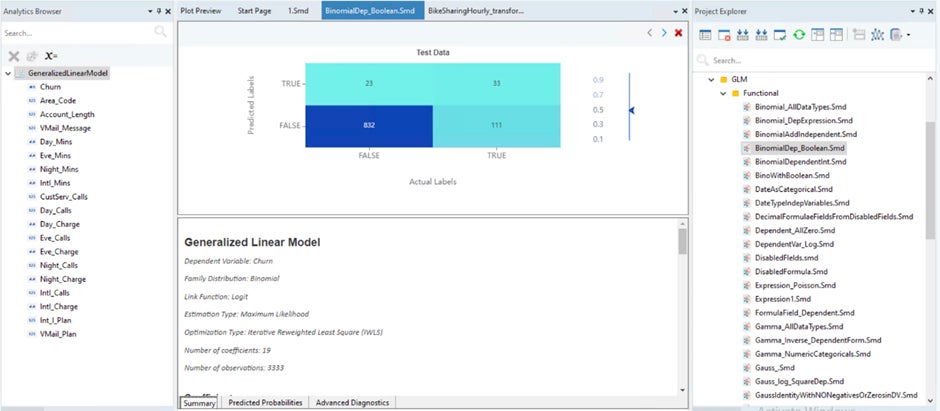
![]()
Best for Low-Code/No-Code Management
Overall Score: 3.30
Core Features: 3.5
Enterprise Features: 2.5
Support: 3.5
Integrations: 3
Pricing: 4
Qlik’s recent acquisition of Talend brings two data management powerhouses together in a unified solution for continually ingesting enterprise data into popular data repositories in real-time. The Qlik Talend solution provides data integration, data quality, and data governance in a single, low-code platform.
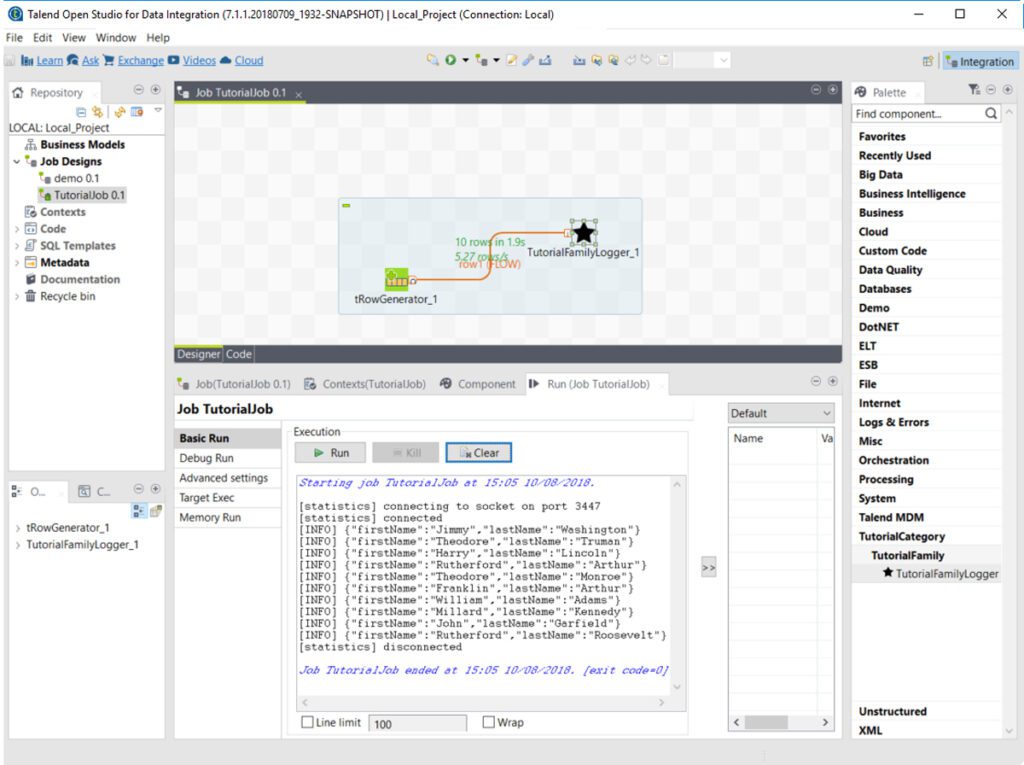
![]()
Best for Microsoft Ecosystem Integration
Overall Score: 4.65
Core Features: 4.5
Enterprise Features: 4.5
Support: 4.5
Integrations: 5
Pricing: 4.5
Microsoft’s Azure Data Factory is a cloud-based data management service that focuses primarily on data integrations. By connecting and collecting, transforming, and publishing data for BI applications, Azure Data Factory is an ideal data management solution for Azure BI and other Microsoft cloud-related services.
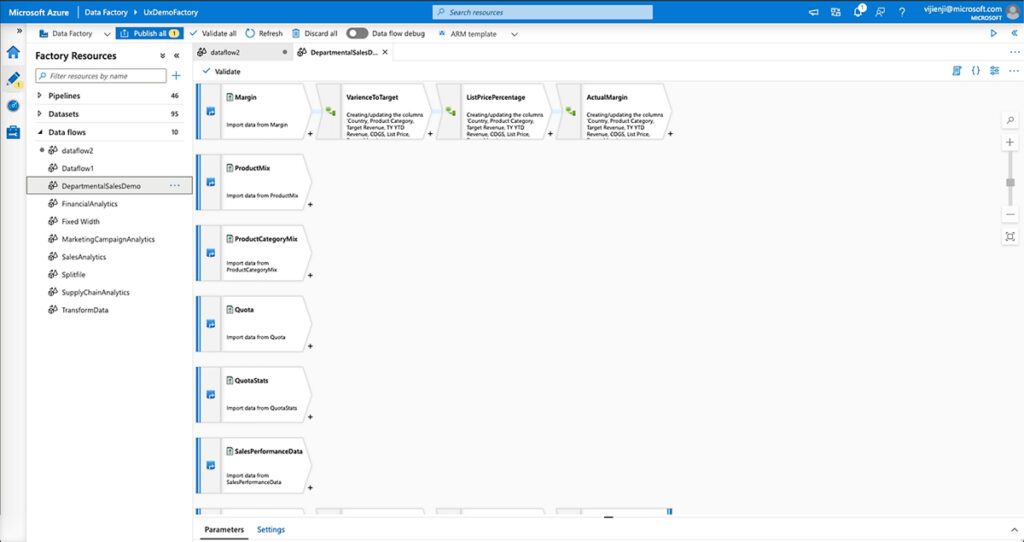
![]()
Best for Core Features
Overall Score: 4.13
Core Features: 4.5
Enterprise Features: 4.5
Support: 5
Integrations: 3.5
Pricing: 3
The Ataccama ONE platform unifies data governance, data quality, and master data management (MDM) under a single interface. The solution offers a range of AI features as well as support for both hybrid and cloud environments.

![]()
Best for Open Source
Overall Score: 4.15
Core Features: 5
Enterprise Features: 5
Support: 2.5
Integrations: 5
Pricing: 5
Co-developed and maintained by Acryl Data and LinkedIn, DataHub’s open-source metadata management platform is a powerful solution for ensuring that information can be integrated, accessed, shared, linked, analyzed, and maintained across an organization’s data estate.
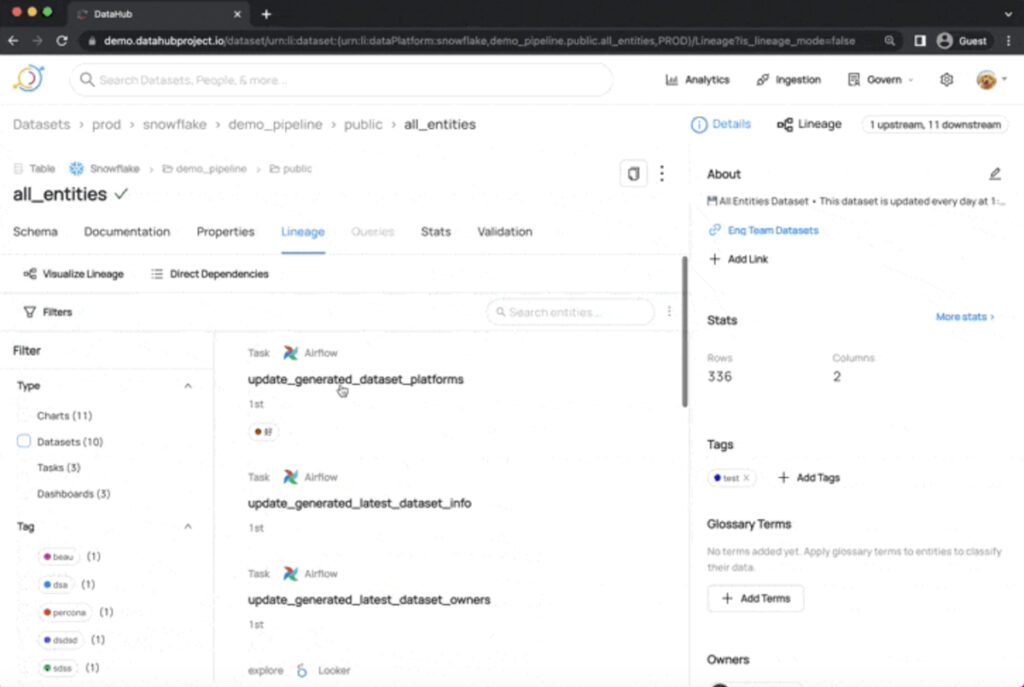
![]()
Best for Analytics Tools
Overall Score: 3.48
Core Features: 3
Enterprise Features: 4
Support: 2.5
Integrations: 3.5
Pricing: 3
Collibra offers a data intelligence cloud that enables organizations to extract more value from their data assets. The data management platform incorporates AI governance and other powerful data analytics features—many of which came from its recent acquisition of Owl Analytics.
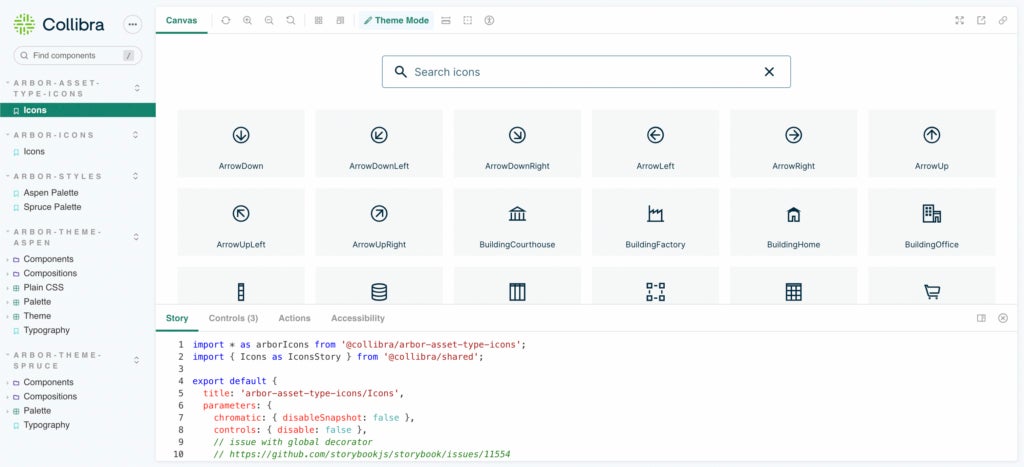
![]()
Best for Leading Data Warehouse Integrations
Overall Score: 3.53
Core Features: 4
Enterprise Features: 3
Support: 2.5
Integrations: 5
Pricing: 3
Atlan’s data catalog solution gives organizations a centralized repository for managing their data assets and provides a systematic, organized way for data professionals and business users to find, access, and manage the organization’s data.
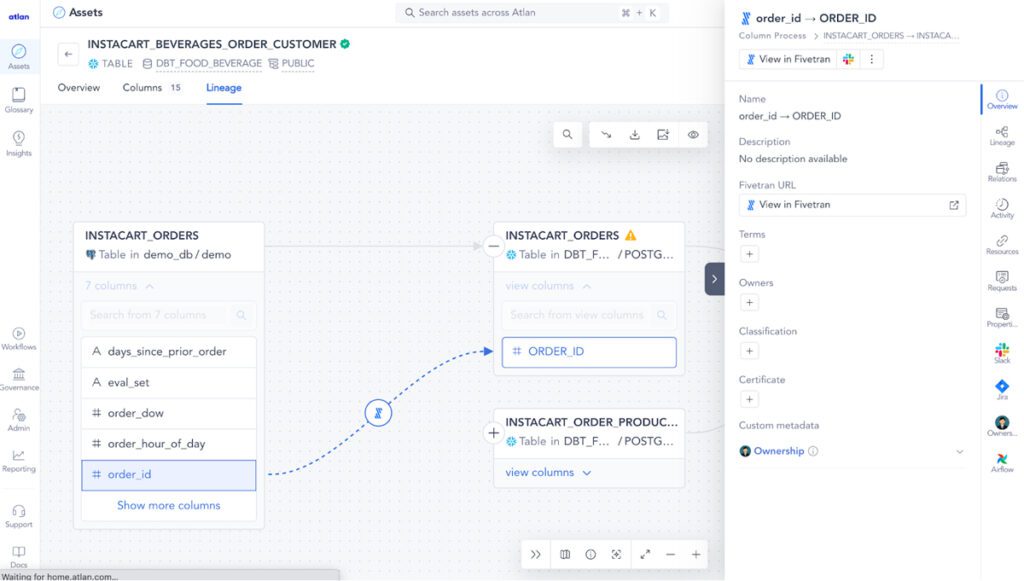
![]()
Best for Data Search and Retrieval
Overall Score: 2.83
Core Features: 2.5
Enterprise Features: 3
Support: 1
Integrations: 4.5
Pricing: 5
Created by Lyft, Amundsen offers a data discovery and metadata management platform geared for data analysts, data scientists and engineers. The solution features a page-rank style search based on usage patterns and data resource indexing of tables, dashboards, streams, and more.
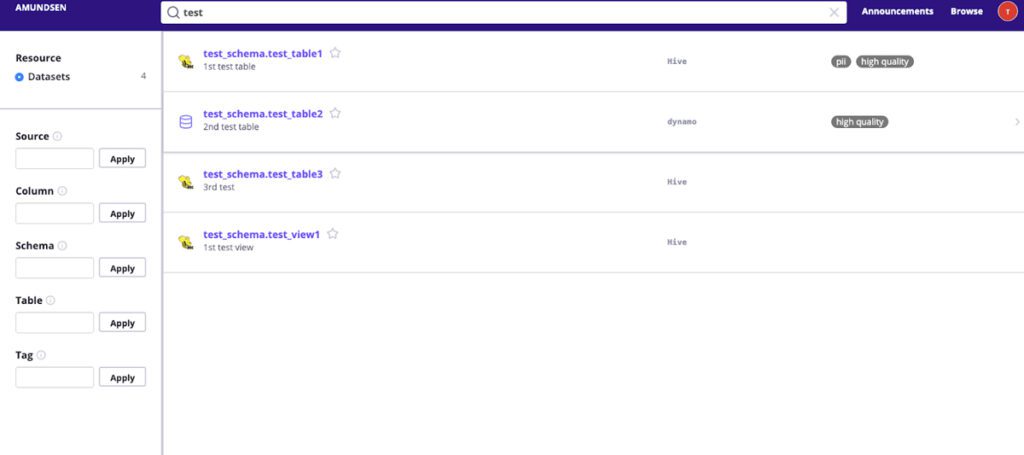
![]()
Best for Data Source Connectors
Overall Score: 2.8
Core Features: 3
Enterprise Features: 3.5
Support: 2
Integrations: 3.5
Pricing: 3
Alation’s data intelligence platform has a large footprint across all industries, from banking and finance to retail and government. The solution allows organizations to centralize their data’s context, rules, policies, definitions, and relationships via a single source of reference.
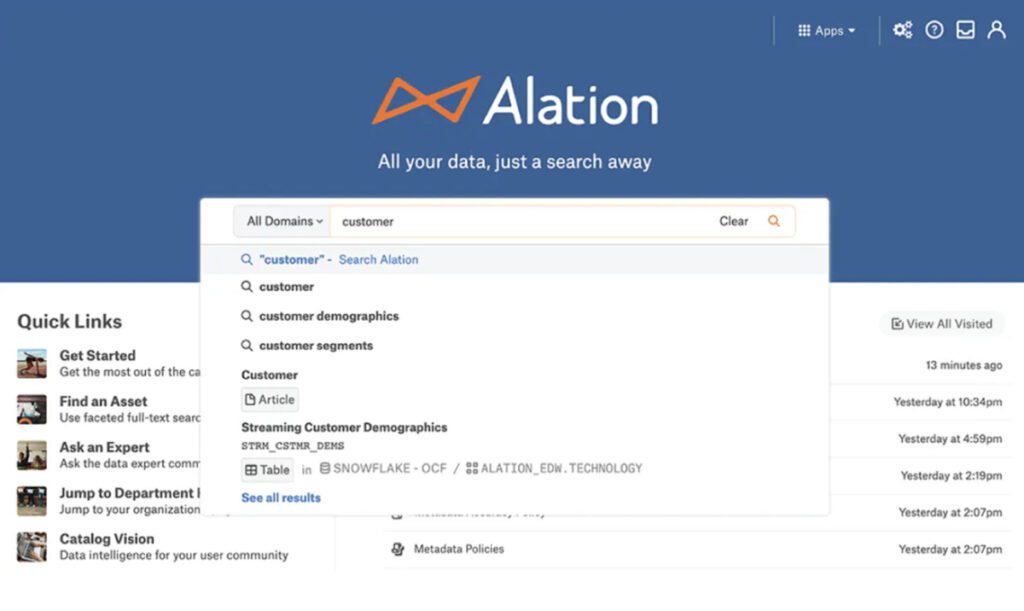
![]()
Best for Specialized Data Management
Overall Score: 3.90
Core Features: 5
Enterprise Features: 4
Support: 4
Integrations: 3
Pricing: 3.5
Dotmatics is a data management platform focused specifically on science, research, and development use cases and environments. The solution simplifies collecting and processing of instrument data and enables non-technical users to easily glean critical insights directly from their data.
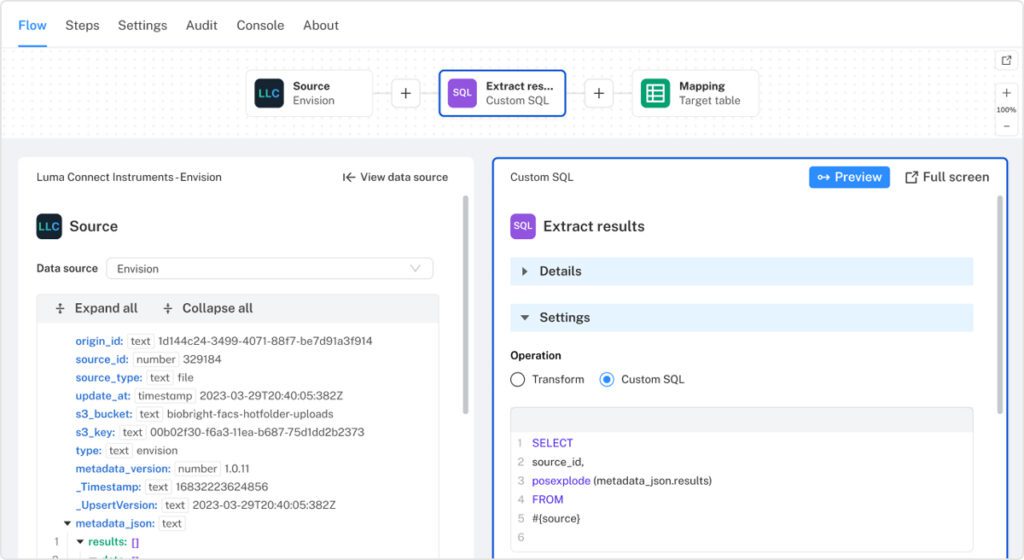
While your data management feature priorities may vary depending on your unique requirements and environments, you should generally keep the following features top-of-mind, with a focus on the tools that align with your organization’s current needs and future growth.
Be sure to select a data management tool that offers robust security features, such as encryption, access controls, and audit trails. Additionally, ensure that the software complies with relevant data protection regulations and industry standards applicable to your business.
Maintaining high-quality data is essential for accurate analysis and decision-making. The software should include features for data cleansing, validation, and enrichment. Additionally, strong governance tools help ensure data accuracy, consistency, and adherence to organizational policies.
Your organization’s data needs are likely to grow over time. Make sure the software can scale seamlessly to handle increasing amounts of data without sacrificing performance. This includes both storage capacity and processing capabilities.
Your data management software should be able to integrate with various data sources and formats—this includes compatibility with different databases, file types, and data protocols. The ability to connect and consolidate data from diverse sources is crucial for gaining comprehensive insights.
A user-friendly interface is essential for ensuring that all members of your data team can effectively use the software. Look for a solution that provides an intuitive dashboard, easy navigation, and clear reporting tools. Accessibility is also critical; the software should be accessible from various devices and locations to accommodate remote teams.
The data management solutions in this list range from leading open-source platforms developed or released by other large organizations (Linkedin’s DataHub and Lyft’s Amundsen, for example) to highly-specialized data platforms to support research and science (Dotmatics).
In many cases, choosing the best data management software for your organization hinges on the composition of your current data estate—for example, if your data infrastructure is hosted in Microsoft Azure’s cloud, then Azure Data Factory will likely be your go-to data management tooling option.
Finally, pay close attention to the criteria we used to evaluate this software, detailed in the next section. These are the key requirements common to most enterprise users for data management software and will help you narrow down the list to those solutions that best meet your particular needs.
To evaluate the leading data management tools, we analyzed each solution across the following key criteria.
For core features, we analyzed AI/ML options, the quality of dashboards and visualizations, data workflow management and collaboration features, and analytics tools.
Critical enterprise features include multi-language/multi-region availability, hybrid data options, data privacy and compliance controls, data estate management tools, and the cadence and regularity of feature enhancements.
We evaluated live chat options, phone support, email support, premium support, and the quality of self-help items (for example, documentation and knowledge base) in gauging the offering’s support resources.
Some evaluation measures related to integrations include API availability and quality, depth of ecosystem, developer resources, and available plugins and libraries.
In evaluating vendors, we looked at the breadth of their software suites, business type, customer base, length of time in business, and such reputational factors as data breaches, privacy incidents, product roadmaps, and acquisitions.
In terms of pricing, we looked at the availability of a free trial, overall cost, pricing tiers, and discounted add-on/option prices and upgrades, if any.
Data management software is a set of tools and applications designed to efficiently store, organize, and retrieve data.
Data management software is crucial for organizations, as it helps maintain data accuracy, ensures compliance with regulations, and facilitates informed decision-making.
Data management software employs security features such as encryption, access controls, and regular backups to safeguard sensitive information. These measures help prevent unauthorized access, data breaches, and ensure the integrity of the stored data.
Data management software includes features for data cleansing, validation, and normalization. These processes enhance data quality by identifying and rectifying errors, inconsistencies, and redundancies, ensuring that organizations work with reliable and accurate information.
Yes, data management software often includes features to help businesses comply with various data protection regulations. It allows organizations to track and manage data usage, implement privacy controls, and generate audit trails, aiding in adherence to legal requirements.
Scalability is a key feature of data management software, enabling businesses to handle increasing volumes of data as they grow. These tools can adapt to the evolving needs of an organization by providing flexible storage options, efficient data processing, and seamless integration with other business systems.
In short, a competent data management software platform can provide your organization with agile and resilient mechanisms for managing vast amounts of information. By streamlining data processes, mitigating risks, and enhancing data quality, data management tools empower firms to make informed decisions, comply with regulations, and ultimately thrive in today and tomorrow’s data-driven landscapes.
Read 10 Best Data Mining Tools for 2023 to learn more about the software enterprise organizations use to find patterns in massive volumes of data to fuel decision-making.

Datamation is the leading industry resource for B2B data professionals and technology buyers. Datamation's focus is on providing insight into the latest trends and innovation in AI, data security, big data, and more, along with in-depth product recommendations and comparisons. More than 1.7M users gain insight and guidance from Datamation every year.
Advertise with TechnologyAdvice on Datamation and our other data and technology-focused platforms.
Advertise with Us
Property of TechnologyAdvice.
© 2025 TechnologyAdvice. All Rights Reserved
Advertiser Disclosure: Some of the products that appear on this
site are from companies from which TechnologyAdvice receives
compensation. This compensation may impact how and where products
appear on this site including, for example, the order in which
they appear. TechnologyAdvice does not include all companies
or all types of products available in the marketplace.